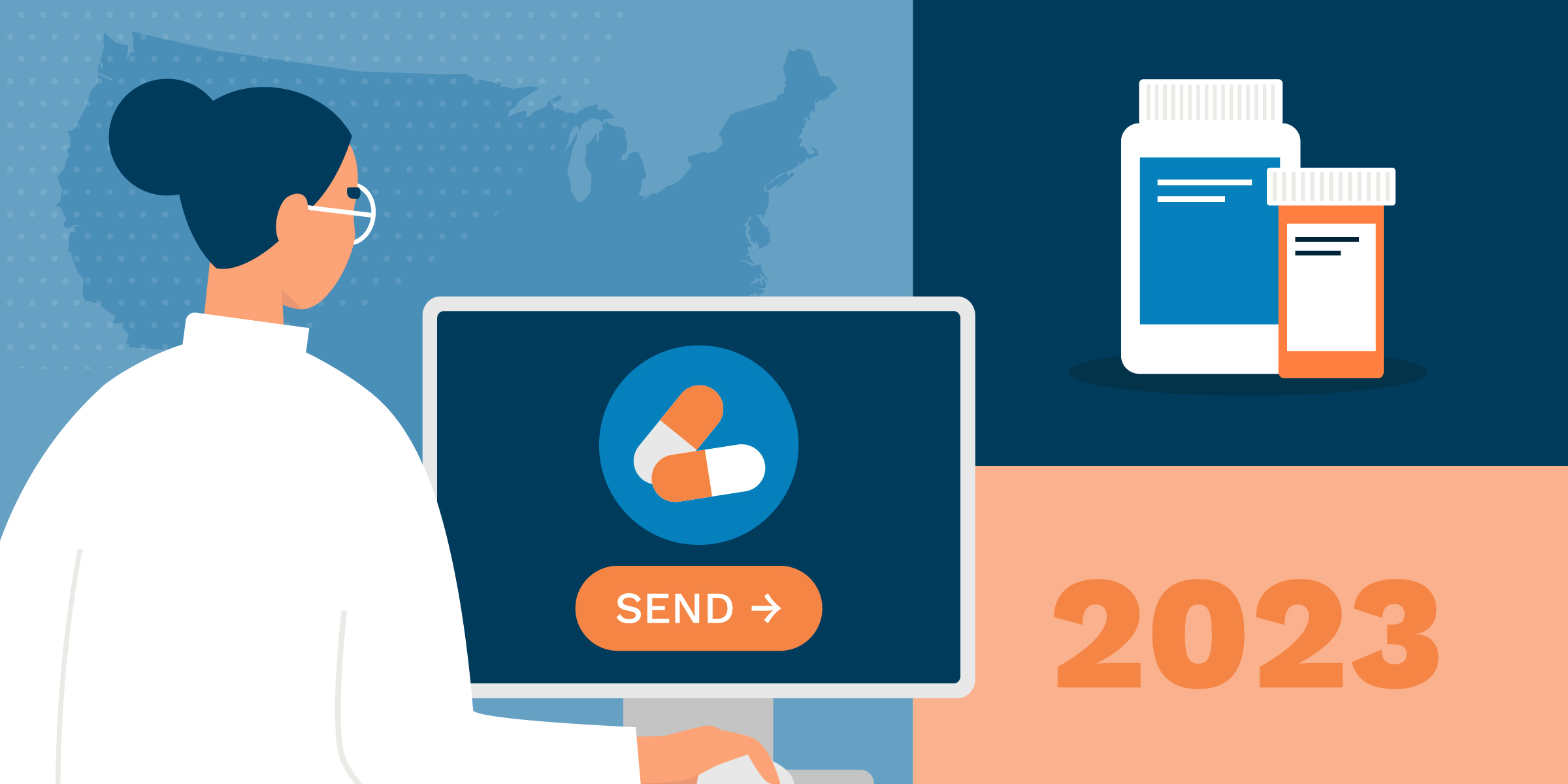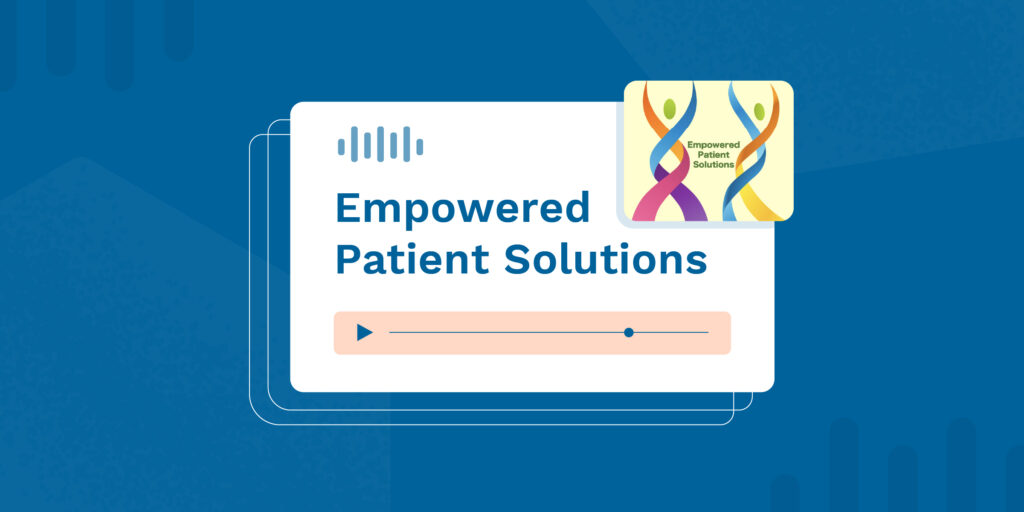2018 brought the United States’ first drop in drug-associated deaths in 25 years, but the following years have been grim. The nation’s life expectancy dropped for the second year in a row in 2022 due to drug overdose deaths and the COVID-19 pandemic, with pre-pandemic opioid death rates already staggeringly high. A combination of immense losses during the COVID-19 pandemic, recent increases in drug-related deaths, and demands to change how healthcare is delivered is significantly affecting the future of controlled substance prescriptions. Electronic Prescribing for Controlled Substances (EPCS) can help improve the nation’s health landscape via individual State Mandates and the Federal CMS Medicare Part D mandate.
CMS’s Medicare Part D EPCS Legislation: Where Are We Now in 2023?
With the healthcare landscape rapidly shifting, gone are the days of handwritten prescriptions and lackadaisical security around prescription drugs. The U.S. government has taken measures since the early 2000’s to address the ongoing drug abuse crisis with greater controls around prescription opioids and the expansion of treatment and recovery options. Electronic Prescribing for Controlled Substances (EPCS) is one measure requiring that clinical prescribers write controlled medications electronically. EPCS began in 2010 as a proposal by the Drug Enforcement Administration (DEA) to block the abuse of controlled substances by creating a more transparent and accountable system for prescribers and pharmacies.
In 2018, Section 2003 of the H.R. 6 – SUPPORT for Patients and Communities Act (also referred to as the SUPPORT act) mandated that Schedule II-V controlled substances under Medicare Part D should be prescribed electronically by January 1st, 2021. Due in part to COVID-19, in late 2020, the United States federal government’s Centers for Medicare and Medicaid Services (CMS) issued a final ruling that delayed enforcement of compliance penalties by one year until 2022. A year later, CMS again delayed federal ECPS compliance enforcement for Medicare Part D until 2023.
On January 1st, 2023, CMS finally began enforcement for the use of Electronic Prescriptions for Controlled Substances (EPCS) for all Schedule II, III, IV, and V medication drugs prescribed under Medicare Part D. CMS requires that “Part D sponsors, prescribers, and dispensers…support electronic prescribing” for controlled substance prescriptions, or risk facing compliance enforcement actions.
At the same time, more than half of 50 U.S. states now fall under some kind of individual State EPCS mandate. Yet more than 20% of nationwide prescribers are not enabled for electronic prescribing as of January 2023, according to SureScripts. Pharmacies have done a better job of adoption, with just 3% of pharmacies nationwide remaining noncompliant. Whether your state has current legislation and requirements or not, it’s only a matter of time before mandates affect your practice. To ensure compliance with EPCS mandates, the process should be undertaken proactively depending on the size of your organization as it may take days, weeks, or months to gather all of your necessary information and find a certified, compliant E-Prescribing software solution.
Which Individual U.S. States Have EPCS Legislation?
In 2011, Minnesota was the first state to enact legislation addressing EPCS. Other states have since followed suit with their own EPCS regulations—such as New York in 2016—who have paved the way for adoption. New York state saw its first decline in drug-related deaths since 2009 in 2018, with a 4.1% year-over-year reduction. Also of note are some of the previously-hardest-hit states, such as Maine, Connecticut, Delaware, and West Virginia. As of January 2023, the U.S. states with existing EPCS legislation or with 2023 and 2024 deadlines include:
- Arizona
- Arkansas
- California
- Colorado – Initial Deadline: 7/1/21, Dentists & Rural Prescribers: 7/1/2023
- Connecticut
- Delaware
- Florida
- Illinois – Original Deadline: 1/1/23, Compliance Enforcement: 1/1/2024
- Indiana
- Iowa
- Kansas
- Kentucky
- Maine
- Maryland – Original Deadline:1/1/22, Compliance Enforcement: 1/1/2023
- Massachusetts
- Michigan – Original Deadline:10/1/21, Compliance Enforcement: 1/1/2023
- Minnesota
- Missouri
- Nebraska – Initial Deadline: 1/1/22, Dentists: 1/1/2024
- Nevada
- New Hampshire
- New Mexico
- New York
- North Carolina
- Oklahoma
- Pennsylvania
- Rhode Island
- South Carolina
- Tennessee
- Texas
- Utah – Original Deadline:1/1/22, Compliance Enforcement: Delayed, TBD
- Virginia
- Washington
- West Virginia
- Wyoming
These states can provide data regarding EPCS, proving that electronic or e-prescription tools are much more than an efficient and transparent method to prescribe; they’re also effective in the prevention of drug overdoses. Providing a “paper trail” of comprehensive medication history at providers’ and pharmacists’ fingertips, EPCS helps to inform and improve prescribing decisions while reducing overprescribing, overuse, and resulting drug addiction. EPCS also improves the security of controlled substance prescriptions, helping to reduce fraud and diversion. This is underscored by the fact that an e-prescribing mandate is now part of the Every Prescription Conveyed Securely Act.
All of the 2023/2024 State-Level EPCS Mandate Deadlines
Providers should be aware of upcoming deadlines and be proactive in preparation for these deadlines, as the collection of materials may take several weeks or months unless you are working with a third-party that can expedite the process. As of January 2023, states with 2023 deadlines are below, with a few additional states set to enforce compliance in 2024.
- Colorado – Initial Deadline: 7/1/21, Dentists & Rural Prescribers: 7/1/2023
- Illinois – Original Deadline: 1/1/23, Compliance Enforcement: 1/1/2024
- Maryland – Original Deadline:1/1/22, Compliance Enforcement: 1/1/2023
- Michigan – Original Deadline:10/1/21, Compliance Enforcement: 1/1/2023
- Nebraska – Initial Deadline: 1/1/22, Dentists: 1/1/2024
- Utah – Original Deadline:1/1/22,Compliance Enforcement: TBD
Your healthcare institution should stay vigilant about sYour healthcare institution should stay vigilant about state mandates. Follow your state’s guidelines to stay up to date!
Are you ready to meet the EPCS requirements? RXNT’s award-winning Electronic Prescribing software satisfies all federal and state regulations and is certified by the DEA to support EPCS. Our cloud-based software is a five-time Surescripts award-winner, is ONC-ACB certified, and meets or exceeds all HIPAA requirements.
With simple pricing, you’ll get fully-integrated solutions, 24/7 cloud-based access, premium in-house setup and support, mobile applications for iOS and Android, and regular system upgrades. We’re happy to help you find accurate federal and state-level information and schedule a convenient, free demonstration of our fully-compliant, certified E-Prescribing software.
The information in this article is current as of January 2023 and is for general information purposes only. RXNT makes no warranties or representations of any kind, express or implied, about the accuracy, completeness, or reliability of the information in this article. RXNT assumes no liability for any damages caused by inaccuracies in this content. All users should consult with their jurisdiction for the most up-to-date and accurate information about any existing or pending legislation.





